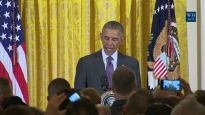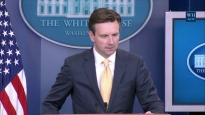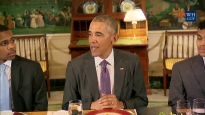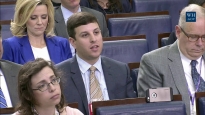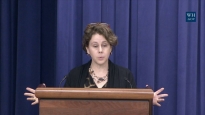Weekly Address: Extending Middle Class Tax Cuts to Grow the Economy
November 10, 2012 | 3:46 | Public Domain
In his weekly address, President Obama says that it’s time for Congress to pass the middle class tax cuts for 98% of all Americans. Both parties agree that this will give 98% of families and 97% of small businesses the certainty that will lead to growth, and so there is no reason to wait. On Tuesday, the American people voted for compromise and action, and the President calls on Congress to come together in that spirit to help create jobs and strengthen our economy.
Weekly Address: Extending Middle Class Tax Cuts to Grow the Economy
Hello, everybody.
On Tuesday, America went to the polls. And the message you sent was clear: you voted for action, not politics as usual. You elected us to focus on your jobs, not ours.
That’s why I’ve invited leaders of both parties to the White House next week, so we can start to build consensus around challenges we can only solve together. I also intend to bring in business, labor and civic leaders from outside Washington to get their ideas and input as well.
At a time when our economy is still recovering from the Great Recession, our top priority has to be jobs and growth. That’s the focus of the plan I talked about during the campaign. It’s a plan to reward businesses that create jobs here in America, and give people access to the education and training that those businesses are looking for. It’s a plan to rebuild our infrastructure and keep us on the cutting edge of innovation and clean energy. And it’s a plan to reduce our deficit in a balanced and responsible way.
This is even more important because at the end of this year, we face a series of deadlines that require us to make major decisions about how to pay down our deficit – decisions that will have a huge impact on the economy and the middle class, now and in the future.
Last year, I worked with Democrats and Republicans to cut a trillion dollars’ worth of spending, and I intend to work with both parties to do more. But as I said over and over again on the campaign trail, we can’t just cut our way to prosperity. If we’re serious about reducing the deficit, we have to combine spending cuts with revenue – and that means asking the wealthiest Americans to pay a little more in taxes. That’s how we did it when Bill Clinton was President. And that’s the only way we can afford to invest in education and job training and manufacturing – all the ingredients of a strong middle class and a strong economy.
Already, I’ve put forward a detailed plan that allows us to make these investments while reducing our deficit by $4 trillion over the next decade. Now, I’m open to compromise and new ideas. But I refuse to accept any approach that isn’t balanced. I will not ask students or seniors or middle-class families to pay down the entire deficit while people making over $250,000 aren’t asked to pay a dime more in taxes. This was a central question in the election. And on Tuesday, we found out that the majority of Americans agree with my approach – that includes Democrats, Independents, and Republicans.
Now we need a majority in Congress to listen – and they should start by making sure taxes don’t go up on the 98% of Americans making under $250,000 a year starting January 1. This is something we all agree on. Even as we negotiate a broader deficit reduction package, Congress should extend middle-class tax cuts right now. It’s a step that would give millions of families and 97% of small businesses the peace of mind that will lead to new jobs and faster growth. There’s no reason to wait.
We know there will be differences and disagreements in the months to come. That’s part of what makes our political system work. But on Tuesday, you said loud and clear that you won’t tolerate dysfunction, or politicians who see compromise as a dirty word. Not when so many of your families are still struggling.
Instead, you want cooperation. You want action. That’s what I plan to deliver in my second term, and I expect to find leaders from both parties willing to join me.
Thanks, and have a great weekend.
###
|
June 9, 2016
|
June 9, 2016
|
June 9, 2016
|
June 9, 2016
|
|
June 7, 2016
|
June 7, 2016
|
June 7, 2016
|
June 6, 2016
|
- &lsaquo previous
- …
- 43
- 44
- 45
- 46
- 47
- 48
- 49
- 50
- 51
- …
- next &rsaquo
